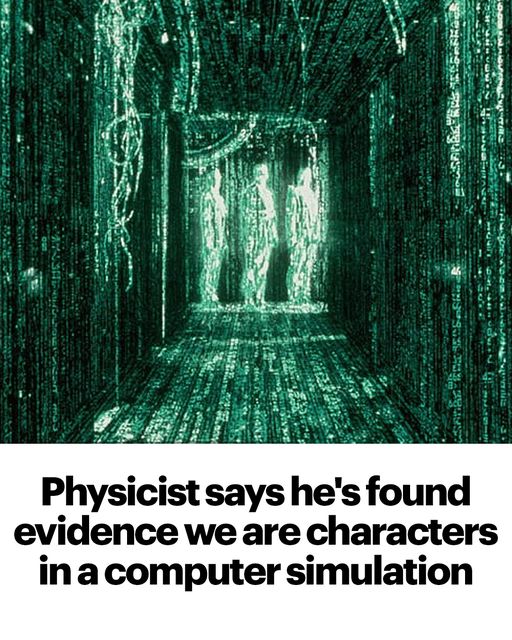The idea that our reality is nothing more than an intricate virtual simulation has fascinated the human mind for years.1 This notion has been a recurring theme in science fiction, with movies like “The Matrix” taking us deep into the rabbit hole of simulated existence. But lately, it’s not just fiction or conspiracy theories; it’s finding its place in the realm of science and academia. Physicists and philosophers have been pondering this question for quite some time. Dr. Melvin Vopson, a physicist at the University of Portsmouth in the United Kingdom, added a new twist to this age-old concept. He suggests that a new law of physics might support the idea that our perceived reality is actually us living in a simulation running on a cosmic computer.
The Simulated Universe Hypothesis
The notion that the universe operates based on quantum codes has been around for a while, popularized by philosopher Nick Bostrom’s paper on the simulation argument. Bostrom proposed that advanced civilizations could create intricate simulations for various purposes, such as exploring their history or entertaining their offspring. This idea has gained popularity, even among influential figures like Elon Musk, who suggested that our odds of living in “base reality” are incredibly low. So, could we be like characters in a video game, constrained to a limited world, while more advanced beings observe our existence?
Dr. Vopson’s research stems from a fundamental idea: information is the building block of the universe and possesses energy and mass. He compares this to the cells of living organisms, which are coded with DNA containing essential information about themselves. His breakthrough came when he observed that information systems don’t follow the second law of thermodynamics, which states that natural processes lead to increased disorder or entropy.
Surprisingly, Vopson found that entropy in information systems can decrease, leading him to establish what he calls the second law of information dynamics. In his recent paper, published in AIP Advances, Vopson uses this concept to explain how the removal of excess information in our universe mirrors the process of a computer deleting or compressing unnecessary code to save storage space and conserve power. This process supports the idea that our reality could be a Matrix-style artificial environment, where everything we perceive is a virtual facsimile.
The Implications and Challenges of Living in a Simulation
While Dr. Vopson’s work provides empirical evidence that bolsters the simulation hypothesis, it’s essential to note that this theory is challenging to prove or disprove. According to David Kipping, an astronomer at Columbia University, recent research suggests that the odds of living in a base reality are almost evenly split, with a slight favor toward our universe not being simulated. However, the key takeaway is that this theory is incredibly thought-provoking and keeps pushing the boundaries of our understanding of reality.
The question of whether we’re living in a simulation raises many intriguing debates, but is it something that can be tested? Some scientists believe that it might be possible to identify glitches or anomalies in the simulation, which could serve as evidence.2 However, the current consensus leans towards the idea that if the simulation is perfect and has infinite computing power, we might never find a way to detect it. Instead, some researchers are looking to quantum physics experiments to explore the idea further. Quantum systems, governed by the mysterious wave function, exhibit unique behavior. If we could find inconsistencies or shortcuts in these quantum systems, it might suggest a simulated reality. However, as of now, these ideas remain conjectures, and finding definitive evidence remains a challenging task.
Occam’s Razor: The Simplicity Principle
One scientist, David Kipping, suggests that Occam’s Razor, the principle that the simplest explanation is often the correct one, should lead us to favor the notion that we are living in “base reality.” The simulation hypothesis, he argues, is overly complex, involving nested realities and simulated entities that cannot perceive their true existence. Therefore, Kipping believes that Occam’s Razor should lead us to favor the simpler explanation that we are indeed living in the real world.
The idea of whether we are living in a simulation is a fascinating and perplexing concept. While physicists like Dr. Vopson provide new insights and evidence to support this idea, it remains a theory with no definitive answers. The quest to uncover the truth continues, and for now, we may never be entirely certain whether we are mere characters in an advanced virtual world or inhabitants of a genuine, physical reality. But one thing is clear: the journey to explore this age-old question is far from over.
